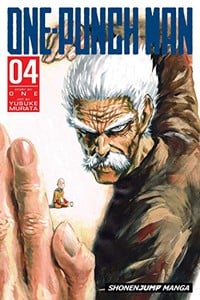Review
by Rebecca Silverman,One-Punch Man
GN 4
| Synopsis: |  |
||
A meteor is zooming towards City Z and all of the Class-S heroes have vanished except for a grizzled old man named Bang and Genos! Since we know that no one can save the day but Saitama, will he bestir himself to do it even though he's been ranked near the bottom of Class-C? Later sea monsters come ashore and wage war on City J, seriously overpowering every hero who tries to take them on. Good thing there's a guy who can end it all with one punch...assuming he can get there in time and isn't just out shopping for cheap seafood. |
|||
| Review: | |||
One of the most effective attacks you can wage on a person is to go for their ego. Bullies have known this for years, and you'd think that this would work doubly well on those people with superpowers and lists of rankings and classes to climb to be truly recognized for their heroic deeds – the system is practically set up to be driven by ego. So when Saitama not only doesn't get recognition for saving City Z from a meteor on a collision course for it, set to obliterate the entire population, and then is actually taunted for the fact that he didn't do a better job saving the city's collective backside, you'd think that might spell, if not the end of his heroic career, than at least the birth of a supervillain. There's just one problem with that reasoning: it assumes that Saitama has an ego to bruise. This is just one more way ONE and Yūsuke Murata's One-Punch Man plays with the conventions of the superhero genre. From the mainstream American superheroes to the corporate sponsored heroes of Tiger & Bunny, roughly 90% of superheroes enjoy getting recognition for their amazing deeds. Even Sailor Moon dreams of getting the kind of media attention her idol Sailor V gets in the start of the magical girl series. Most of them are driven by an urge to do something positive with their powers and skills, actively trying to do something good and enjoying the attention that brings. But not Saitama. Once again in this volume he stresses that the reason he became a hero is simply “for fun.” And when a guy's doing something of his own volition just because he thinks it's a good time, it's a little harder to bring him down with rankings and teasing and other such nonsense. It's part of the parody of One-Punch Man, but it's also what makes Saitama a likable hero – he's just some dude doing stuff 'cause it's fun. This isn't to say that he doesn't get annoyed, because the prevailing attitude towards heroes in general and himself in specific does provoke him to remind everyone that he isn't saving them because he has to. This again feels like a dig at the old Spider-Man saw about great power bringing great responsibility, because Saitama clearly doesn't see it that way. Genos, his self-proclaimed protégé, is much more in line with the basic superhero mythology, and the fact that he isn't human feels like a dig at the genre. On the whole, however, this volume continues the light-hearted satire of its source material with not only ludicrous looking villains – the seafolk king is a muscle man in a speedo with heart-shaped nipples (or pasties; I can't decide) – but also with characters like Bang, a craggy old gentleman who in any other series would become the Wise Old Mentor but here is just sort of brushed off. Other gags, like a truck full of Class-C heroes lumbering towards City J, are also worth a giggle, especially when we see Saitama sprint past them on the highway. There is one joke, however, that doesn't play quite as well, although I can see where it is meant to be funny. Towards the end of the volume the hero Puri Puri Prisoner is introduced, recently broken out of prison with Speed o'Sound Sonic. Apparently Puri Puri's crime is “getting grabby with men,” for which he is serving 10,000 years. In the short story at the end of the volume it is more implied that he stays in prison voluntarily in order to have his way with the (unwilling) prisoners, something that is played off as a joke. Unfortunately the “predatory gay man” stereotype is one that is offensive and dated, detracting from the story. Jokes about “deep kissing” men who don't want to be as punishment and harassing them to the point where their minds apparently snap really don't sit well with me – sexual assault doesn't make for good humor. This really does sour the end of the volume and seems likely to carry over into the start of volume five. That aside, One-Punch Man continues to be an entertaining ride. The deliberately fluctuating quality of the artwork, particularly when it comes to Saitama, is a lot of fun, and the parody is mostly well thought out. If you've had enough of heroic men in tights saving the world because they believe in humanity or feel it their bounden duty to do so with their god-given gifts, One-Punch Man is likely to tickle your funny bone, something that holds as true in volume four as it did when the series began. |
| Grade: | |||
|
Overall : B+
Story : B+
Art : A-
+ Generally fun, good parody of the superhero genre. Fluctuating art style really adds to the humor. |
|||
| discuss this in the forum (9 posts) | | |||
| Production Info: | ||
|
Full encyclopedia details about Release information about |
||